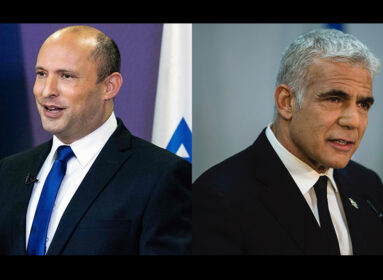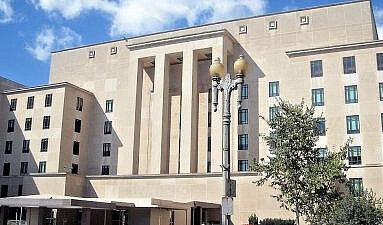
New exhibit seeks to enhance regional Holocaust education
By Cindy Mindell
WEST HARTFORD – After 25 years inhabiting a small closet space at the Mandell JCC of Greater Hartford, the local Holocaust memorial exhibit is getting a major facelift and a new home on the University of Hartford campus.
Built in 1990 during an expansion of the JCC, the Holocaust Memorial Room was created to memorialize victims of the Holocaust related to survivors who had relocated to Greater Hartford after the war, and to educate the Jewish and general communities about the Holocaust. Designed by the Jewish Historical Society of Greater Hartford, the room comprised a text-heavy timeline of Jewish life in Europe pre-World War II, during the Holocaust, and after the war, and a display of artifacts and documents provided by local survivors. School groups often visited the room, where they met with survivors who told of their experiences.
“We realized that we needed something more substantial and more significant, more of a destination, instead of a closet that somebody walks by on their way to the pool,” says Mandell JCC executive director David Jacobs. “We wanted to redesign the Holocaust Memorial Room to bring it into the 21st century.”
Two years ago, as the JCC began planning a new round of renovations, Jacobs convened a design committee together with Estelle Kafer, executive director of the Jewish Historical Society of Greater Hartford. They consulted Prof. Avinoam Patt, the Philip D. Feltman Professor of Modern Jewish History at the Maurice Greenberg Center for Judaic Studies at the University of Hartford, where he is also director of the Museum of Jewish Civilization. The committee saw the Museum of Jewish Civilization at the University of Hartford as the ideal home for the new and redesigned exhibit.
The museum could provide both a contemplative and an educational space that ties in to the Greenberg Center’s educational mission, says Patt. “This exhibit will become a vital resource for the state of Connecticut, where we have no exhibit dedicated to the history of the Holocaust.”
The JCC returned some of the artifacts and documents to the survivors and their descendants and gave others to the Greenberg Center for the new exhibit. Jacobs donated a bronze cast of “Holocaust Memorial,” the commissioned sculpture by local artist Elbert Weinberg z”l that has inhabited the JCC grounds since 1981.
Patt, Jacobs, and Kafer worked with a team of designers, including DreAnna Hadash, Steve Shaw, and Nild Sansone, to design the new exhibit.

Concentration camp uniform and yellow star worn by Herman Ziering, best friend of Abby Weiner of West Hartford, who was sent to concentration camps in Kaiserwald and Stutthof. After liberation in 1945, he came to England where he met Abby Weiner. The two soon became best friends. He passed away in Israel in November 2005.
“Hartford Remembers the Holocaust” will open at the Greenberg Center’s annual Holocaust Educators Workshop on Oct. 31. Guided by the theme “Teach for the Future: Holocaust Education in the 21st Century,” the program will feature a panel discussion by the six Greater Hartford-area survivors – three men and three women – featured in the exhibit: Margot Jeremias, Ruth Fishman, Rabbi and Ruth Lazowski, Leon Chameides, and Abby Weiner. Patt decided to launch the exhibit at the educators’ workshop – which is free of charge for the first time – “because I am especially focused on arranging field trips for schools from around the state to view the exhibit,” he says. “I also want teachers to develop curricula that they can use with their students in association with the exhibit.”
The six survivors featured are actively involved in local Holocaust education and who each endured different wartime experiences – in ghettos and concentration camps, hid by Christians or in the forest.
“I also wanted to feature survivors who are still with us so that they could participate in the educators’ workshop and share materials for the exhibit,” he says. “In the next stage of the exhibit, we’re going to feature other survivors who came to the community and who are no longer with us, who recorded video testimonies,” either for the Fortunoff archive or elsewhere.
The public opening will take place on Wednesday, Nov. 9 as part of a community-wide Kristallnacht commemoration. Prof. James Young from the University of Massachusetts and Joanne Rudof from the Fortunoff Video Archive for Holocaust Testimonies at Yale University will be guest speakers at a presentation on “The Future of Holocaust Memory in the 21st Century.”
Visitors will enter the museum through an exhibit of portraits of local Holocaust survivors, photographed by Lena Stein. They will view a short video, Remember, created by Steve Shaw, which premiered at last year’s Mandell JCC Hartford Jewish Film Festival. An introductory panel will provide background on the three main questions addressed in the exhibit: What do we remember? How do we remember? Why do we remember?
Each of six display cases tells a local Holocaust survivor’s unique story of survival, with an iPad viewing station for visitors to view excerpts of a videotaped testimony.
“There’s a perception that there are only one or two stories of survivors constantly taught at the middle school and high school levels – usually Elie Wiesel and Anne Frank,” says Patt. “Knowing that we have survivors in our community, and knowing their amazing stories of survival, I thought it would be important to make our local survivors the focal point of this question of how Hartford remembers the Holocaust. Through their stories, we can provide the local connection for students and community members to understand that this is not just something that happened long ago in a faraway place, but still continues to have an impact on people who live in our community and on their descendants – who are committed to teaching about the Holocaust to make sure that it never happens again.”
The exhibit also includes interactive videos of interviews between the six survivors and their children, from “In Their Own Words,” a project conducted by the Greenberg Center and Voices of Hope, a statewide non-profit organization founded by descendants of Holocaust survivors.
A final display will summarize the end of the war and the arrival of Holocaust survivors in Greater Hartford and their impact on our community.
Sponsors of the exhibit include the Connecticut Humanities Council, the Maximilian and Marian Hoffman Family Foundation, the Jewish Community Foundation of Greater Hartford, and the Jewish Federation of Greater Hartford. The United States Holocaust Memorial Museum and the Fortunoff Video Archive for Holocaust Testimonies at Yale University provided guidance and materials for the exhibit.
“Behind redesigning and recreating the exhibit is the question, how will we remember the Holocaust in the 21st century?” Patt says. “The exhibit itself and the theme of what we’re doing is not only trying to remember but also paying tribute to the survivors who have done so much in the area of Holocaust education and Holocaust memory. Right now we have survivors in our community, this amazing treasure and resource. Any local student who has learned about the Holocaust will say that the experience with the greatest educational impact was the opportunity to meet a survivor. What will we do when we don’t have the survivors anymore? How do we recreate and replicate that experience? We can’t replace it, but the exhibit is put together with an eye to thinking about how to preserve that experience for future generations of students as well.”
University of Hartford Kristallnacht Observance, Wednesday, Nov. 9:
- 7 p.m. – Wilde Auditorium, Harry Jack Gray Center: “The Future of Holocaust Memory in the 21st Century” with James E. Young, professor of English and Judaic studies, University of Massachusetts Amherst; and Joanne Rudof, librarian, Fortunoff Video Archive for Holocaust Testimonies, Yale University. University of Hartford
- 8:30 p.m. – Museum of Jewish Civilization, Mortensen Library, Harry Jack Gray Center: Exhibit opening of “Hartford Remembers the Holocaust.”
Limited seating; reservations required: (860) 768-5018 / mgcjs@hartford.edu.
CAP: The exhibit features the stories of six local Holocaust survivors.







 Southern New England Jewish Ledger
Southern New England Jewish Ledger















